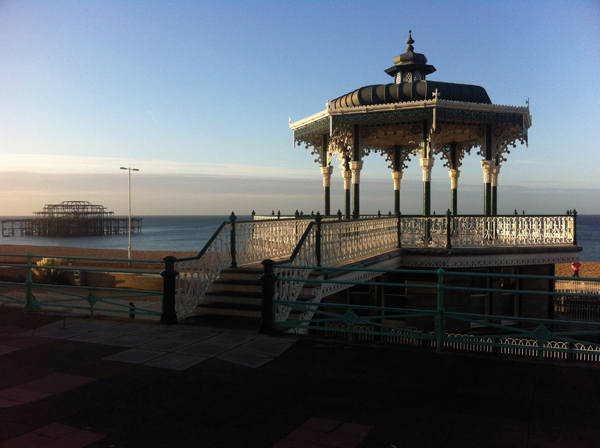Stags and hens are big business for Brighton but should we call time?
An economy built on drinking and partying comes at a price. The Chamber of Commerce is asking about the costs and benefits in a Big Debate. Frank le Duc reports

“At night, the streets of Brighton become awash with alcohol-crazed hen and stag parties, clubbers and general yobbery, noisily rendering the late night and early morning city centre almost a no-go area for those who don’t want to join their revelry, and thereby damaging the city’s image.”
That’s a point of view being heard increasingly often in Brighton and Hove. But so is the viewpoint that Brighton is the country’s seaside party capital, fun is in its blood and its night time festivity is core to the city’s image, reputation, culture and income.
On Wednesday 26 September the Brighton and Hove Chamber of Commerce will be holding the next in its series of Big Debates: “This house believes that Brighton’s night time economy is tarnishing the city’s brand.” Proposing the motion will be Andy Winter, chief executive of Brighton Housing Trust, and Justin Manning, general manager of the Queen’s Hotel. Opposing the motion and defending the night time culture against the charge of tarnishing Brighton’s brand will be Nigel Liddell, manager of the Brighton and Hove Business Crime Reduction Partnership, and Ian Chisnall, co-ordinator of Brighton and Hove Street Pastors and an independent candidate in the election for post of Police and Crime Commissioner in November.
The business-focused debate will take a traditional format of panel speeches for and against the motion, followed by speeches and contributions from the floor. Voting at the beginning and end will show how much the debate has swayed people’s feelings.
The debate will be chaired by local business owner Rob Shepherd, of the press release agency Press Dispensary, who said: “Some feel that debating our night-time economy is a taboo that needs to be broken. As citizens, we are perhaps all troubled from time to time when we see so many gaggles of hens zigzagging across town at night, hear the dawn aftermath of 24-hour bar culture and then read of the clean-up bills and other repercussions. But don’t we also treat the revellers’ money as our city’s golden egg, to be preserved no matter what?
“On the other hand, how much of this money really stays in the city? And how do short-term gains stack up against our long-term reputation as a business and tourist destination? Or isn’t this revelry and night-time tourism already our reputation? Isn’t this what the city sells its visitors? And is any fuss about the negative effects just over-hyped or over-conservative?”
Julia Chanteray, president of the Brighton and Hove Chamber of Commerce and owner of consultancy The Joy of Business, said: “I think this will be one of the most fascinating Big Debates we’ve held so far. It goes right to the heart of our city’s make-up, what sort of place we want to live and work in and what we think is really good for business. The arguments for and against the night-time economy’s effect on our brand will be heartfelt and fascinating.”
The debate takes place at City College in Pelham Street, Brighton. It’s free to members and non-members but places needed to be booked. To book a seat, go to the chamber of commerce website www.businessinbrighton.org.uk
UPS AND DOWNS OF SEASIDE TOWNS
Brighton was probably the first seaside resort in Britain and has long had a raffish reputation. It is the home of the dirty weekend. And it has long been a popular place to spend the pink pound. The rise of cheap holidays abroad in places like Benidorm put paid to the bucket and spade brigade spending the annual break in British seaside towns like Brighton. The conference trade, language schools and, more recently, the rise of city breaks have helped save the city from the economic woes that have afflicted places like Margate. The Brighton Festival and the city’s many other festivals have also played their part in helping the city to remain an attractive destination.
Brighton and Hove is part of a new organisation called the Coastal Communities Alliance which is trying to reverse the decline. No one believes that mass tourism will return; even the recession has seen a trend for the “staycation”. So politicians and business leaders are trying to find other ways to revive the economy of places. The alliance said that its priorities include identifying and tackling:
• Current barriers to economic growth (physical infrastructure, skills and industry structure)
• The threat of coastal inundation
• The consequences of deprivation (health, neighbourhood and community cohesion and pressure on local services)
• Managing and exploiting the tourism legacy
• Lobbying and influencing on a national platform.
But, in a case study, the alliance found that people living in Brighton and Hove had a worse profile for alcohol-related harm than the national and regional averages. Compared with the population of England, above average numbers of men were dying from causes linked directly – and the same was true of hospital admissions attributable to drink. An above average number of women also needed hospital treatment for drink-related problems. Compared with regional averages, residents of Brighton and Hove have:
• Greater alcohol-specific mortality, alcohol-attributable mortality and mortality from chronic liver disease
• Been admitted to hospital more frequently due to alcohol-related harm or other alcohol-specific or alcohol-attributable reasons
• Committed more alcohol-related crimes, including violent crimes and sexual offences
• More frequently made alcohol-related claims for incapacity benefits among working-age people.
To try to tackle this, Brighton and Hove City Council has worked with local health chiefs and the licensing trade to look at the effects of the relaxed licensing laws brought in almost ten years ago. The council has introduced a cumulative impact area where it is harder to obtain a new licence. The criteria have been refined to make it easier for, say, a new theatre to open with a bar while restricting the number of places likely to sell alcohol to street drinkers.
Any changes won’t happen overnight. Just as the seaside economy won’t suddenly revive where it has fallen into a state of stagnation. But the issues that affect Brighton and resorts such as Blackpool and Scarborough are being discussed beyond the city. And where there are success stories, politicians, health chiefs and businesses are trying to learn the lessons. The chamber of commerce’s Big Debate will provide an opportune moment to check whether we’re selling the right measure to the right people and to work out whether the glass is half empty or half full. One thing’s for sure – we’re not going to call time just yet.
ANDY WINTER
“The growth of alcohol-fuelled anti-social behaviour in areas such as West Street and St James’s Street can make the city centre a very unattractive destination for residents and visitors alike. Quite simply, aspects of the night-time economy threaten the economy of Brighton, including other parts of the night-time economy which are essential for the economic well-being of the city.
“Huge amounts have been invested into making Brighton and Hove a destination of choice. The city is vibrant, the range of attractions and events is unparalleled compared to any point in its history and we are proud of the inclusive culture that exists for residents and visitors alike.
“Yet in spite of the best endeavours of many (the city council, the tourist industry, traders, etc) to see a diversity of facilities and attractions – theatre, restaurants, street performers and community events – these efforts are being undermined by a culture of drunkenness and extreme drunkenness.
“One of the more extreme examples are so called “party houses”. These are houses that are turned over to a dozen or more visitors on hen and stag weekends, or who just want “to party” in a manner that would not be tolerated in hotels and B&Bs. They facilitate the “front-loading” of alcohol even before these visitors descend on the town centre where their behaviour is often not conducive for others (guests staying in hotels, families out for dinner, theatre goers, etc).
“If you have the misfortune to live in the street with a “party house”, your weekends will have turned into a living hell.
“The spending power of those on alcohol-fuelled weekend breaks is limited. They are focused on alcohol outlets that encourage and facilitate further drinking. Having lived in the town centre for many years, and having represented Regency Ward on the old Brighton Borough Council, I now actively avoid going into the centre of Brighton after 8pm on a Friday or Saturday evening. My spending power is thus denied those restaurants and facilities that might otherwise have benefited from it.
“For a year in the 1980s I chaired the Licensing Committee on Brighton Borough Council. That year, because of close co-operation between the council, Sussex Police and licensees, we were able to regulate the night-time economy in such a way that incidents of violence were clamped down on. Licensees who failed to co-operate risked having their public entertainment licences revoked. The result was that on New Year’s Eve 1986, there was not a single arrest for violence or drunken disorder in Brighton.
“Unless we ensure that the night time economy is robustly managed, the image of the city will become tarnished at great cost to businesses and residents alike.”
IAN CHISNALL
“I will be seconding the argument against the motion that Brighton’s night-time economy is tarnishing the city’s brand. I am a late-ish convert to the view I now hold. I have come to this in part as a result of being the co-ordinator for the Street Pastors in Brighton and Hove.
“The night-time economy in our city is not something that has been planned by anyone and is a reflection of crude market forces in the drinking and dancing culture and the paralysed planning processes of the past. My own view is that markets need some level of regulation and while I am pleased that there are now controls in place to limit the number of establishments in the areas of greatest impact, this has come very late in the day. We are now in a period where the worst excesses of this market should be behind us and I would certainly welcome a period of market correction if that can be achieved.
“Nevertheless our city sees many benefits from the night-time economy in terms of jobs, business profits and the spend by visitors who come into the city because of the night life but also visit our shops and stay in our hotels.
“My contention is that the tarnish referred to in the motion, comes as a result of a failure to maintain and care for a forgotten gem. The way to repolish this gem is for residents to reclaim our streets, not in a way that excludes those who come to party, but rather to share and rebalance the use of the space that has become saturated with clubs and pubs.
“The appearance of Street Pastors (about 20 individuals, mostly over 55 and some closer to their 80th birthdays) going out four at a time has made a distinct difference to the tone of the streets and while we have some training and simple uniforms on our side, it is our age and our care for the visitors that has helped to reduce violent crime on our streets.
“If others joined us in our quest to welcome visitors and our own residents just by taking strolls down West Street and up East Street, greeting people they meet with a smile, the impact would be far more positive than the sight of more police uniforms which are at their best when things are at serious risk of getting out of hand – something that only happens rarely! The rest of the time clubbers are prone to see police officers as people to provoke and challenge, in the same way as teenagers can provoke and challenge
their parents.
“The alternative is to consign our forgotten gem to the scrapheap and we cannot afford to do this, and would be the poorer for its loss.”





















